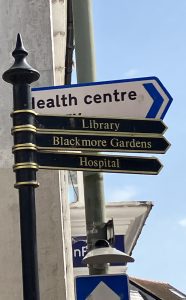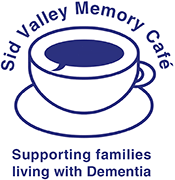HELP and where to find it
Worried about your memory? Or are you worried about changes you see in a loved one?
If you or someone close is struggling in everyday life with poor memory, confusion, difficulty planning and organising, lack of focus or loss of concentration, the first person to call is your GP.
Early diagnosis is vital: it means treatment and management strategies can be started as soon as possible to help you maintain your quality of life. Visit the NHS website to find out more: https://www.nhs.uk/conditions/dementia/symptoms-and-diagnosis/symptoms
A diagnosis will also give you, and those closest to you, access to many forms of state and voluntary health and social support that might not otherwise be available to you, such as Attendance Allowance and the Blue Badge scheme for car users.
Here in the Sid Valley we have an Admiral Nurse, a registered nurse specialist who is trained to give detailed advice and guidance tailored to individual circumstances. Our nurse, Tracey Hansford, regularly visits the Memory Cafe to offer personalised advice to cafe-goers. The Admiral nurse can also be your gateway to the most appropriate NHS and social services care and your GP can refer you to her.
The GP might first examine your physical health, because many conditions produce confusion and memory problems and these need to be treated or ruled out. The doctor may carry out a neuropsychological test called an ACE III test (Addenbrookes Cognitive Examination), which is designed to be an objective assessment of five cognitive abilities: attention; verbal ability band language use; visuospatial abilities and memory. The full length test has a total score of 100: the higher the score, the less cognition is impaired. A score of 82 or less suggests impairment.
Teamwork
You may be referred to a neurologist, gerontologist or psychiatrist, or a mental health team which may include each or any of these, plus a psychologist and specialist nurses. It is these specialists, or a specialist team, that will make a diagnosis following a very detailed and rigorous examination.
It is up to you, those closest to you and your clinicians to determine what support you may or may not need, but even if you feel you can remain completely independent for the foreseeable future, it is wise to take advice from the Admiral nurse and it is well worth accepting all offers of health and social assessment, from drug prescription to physiotherapy and occupational therapy.
Care for carers
The Memory Cafe is unique in offering friendship and regular social activity together with others who fully understand your situation. Fellow cafe-goers can offer you their wisdom in a completely informal way and our Admiral nurse also visits from time to time. She can be available to give one-to-one support. But there are also other local services available to offer support and guidance as you need it.
Caring for someone with dementia can be difficult physically, mentally and emotionally. It is important that you look after yourself, both for your sake and the sake of your cared for loved one.
The NHS has advice for both people living with dementia and their carers, here: https://www.nhs.uk/conditions/dementia/living-with-dementia/looking-after-someone/
You can:
1. Register as a carer with your GP
2. Apply for a carer’s assessment to find out about and access support you may not know exists, https://www.nhs.uk/conditions/social-care-and-support-guide/support-and-benefits-for-carers/carer-assessments/
3. Check if you’re eligible for benefits for carers, https://www.nhs.uk/conditions/social-care-and-support-guide/support-and-benefits-for-carers/benefits-for-carers/
4. Find out about training courses that could help you, for example Dementia UK offers a free online course, https://www.dementiauk.org/news/new-online-course-for-carers-and-professionals-to-help-them-understand-dementias-progression/
Local help
Devon Carers
Through Devon Carers, the Devon-based charity, Westbank, is commissioned jointly by Devon County Council and the NHS Devon Clinical Commissioning Group to provide support services and assessments to unpaid carers across Devon. This, of course, includes the family carers of people living with dementia.
Devon Carers offers support ranging from advice and information, to carers’ assessments and support planning under the Care Act 2014 to over 27,000 unpaid carers across Devon.
You can apply for the Devon Carers’ Passport to access subsidised parking at hospitals and discounts at local shops and services: https://devoncarers.org.uk/support/your-carer-passport-in-devon In 2017 Devon Carers achieved national recognition when it was awarded the Carers Trust Centre of Excellence award for its work with both adult and young carers.
Although Devon Carers offers help covering all disabilities, they do provide specialised advice and information for families affected by dementia, including courses on basic knowledge and skills in supporting a person with a dementia, such as changes in communicating and how to adapt your home.
The organisation also runs sessions on carer resilience covering how to cope and adapt to the changes that occur in family relationships and in the person’s behaviour as their condition progresses; looking at what social and paid support will help; and for carers, how to maintain their own health and wellbeing.Devon Carers’ courses and resilience sessions also offer opportunities to meet other carers in similar situations to learn from one another.
For more information about self-care for carers, Dementia UK has some useful information on their website, https://www.dementiauk.org/information-and-support/looking-after-yourself-as-a-carer/
HOSMS PCN ( Honiton, Ottery St Mary and Sid Valley Primary Care Network)
This is the network formed by GP surgeries in Sidmouth and two neighbouring towns to pool resources and provide more and better services to the areas they cover. The network’s mental health team use wellbeing coaches to support individual patients with a range mental health problems. Mental health and wellbeing coaches can provide up to six sessions of 45 minutes each, by telephone, video or face to face. Care co-ordinators can also give one-to-one support to individuals in accessing other services. The team takes referrals to the service from the network’s GP surgeries.
Older People’s Mental Health Team
In many regions an Older People’s Mental Health team is available and Exeter is home to our local Older People’s Mental Health Service. This community team provides a service to people of any age who are experiencing behavioural and psychological symptoms of dementia. Staff work in the Devon Memory Service, which provides most of the assessments and post diagnostic support to people with early dementia, subject to GP referral.
Other local services that families might find useful are:
Sidmouth Hospice at Home, which provides specialist palliative care to the Sid Valley including services to services to dementia patients and their families; and Sid Valley Help, provides a befriending service at home for people that are lonely and isolated.
Nationwide help
There is a vast amount of information to be found on neurodegenerative diseases in all its forms on the information superhighway that is the worldwide web. Best known and very useful are:
- The NHS
- The Alzheimer’s Society
- Dementia UK
NHS help in general for dementia patients includes the services GPs and hospitals plus other services such as: physiotherapy; audiology; ophthalmology, dentistry and speech and language therapy.
The NHS also offers “continuing healthcare”. This is for people deemed to have complex health and care needs.The cost of all your care at home or in a care home plus local council social services is covered, funded through the local integrated care board (ICB).Qualifying for this is not straightforward, though, and a diagnosis of dementia is not enough in itself. To find out if you qualify you need to undergo an assessment by a panel of healthcare professionals, which you have to request by contacting the continuing healthcare co-ordinator at your local ICB.
NHS-funded nursing care applies to people who are in a nursing home. If you are eligible, the NHS will pay for your nursing care, but again this depends on an assessment by your local ICB.
The Alzheimer’s Society is a countrywide organisation that is the biggest and best known campaigning charity. It funds research as well as providing services for people with dementia. The charity claims unequalled knowledge and experience built over 40 years. Although the main thrust of the charity is to campaign for better support overall for dementia families, it continues to provide services directly or through partnerships with the NHS.
Services include a telephone support line offering personalised information and advice (0333 150 3456); an online community forum that is open day and night to offer support through shared experience and a directory of activity and support groups around the country. All these can be viewed on their website. The society also provides a range of print publications and factsheets.
Dementia UK is the national charity behind the Admiral nurse scheme which funds the training and deployment of these dementia specialist nurses through the NHS. Dementia UK also provides an online Admiral nurse support service including a free dementia helpline(0800 888 6678) A virtual clinic offering online face-to-face (video) appointments or telephone appointments with an Admiral nurse are also available to book through the website. The virtual clinic is available 10am to 5pm, Monday to Friday: appointments are for 45 minutes and are free of charge.
Herbert Protocol is a national scheme which can hold useful information on vulnerable people, to help if they go missing. It records a person’s vital details and a photograph to make searching quicker and easier by the police.
If you are caring for someone at risk of going missing, you can access the form on the Devon and Cornwall Police website, https://www.devon-cornwall.police.uk/advice/advice-and-information/missing-person/missing-persons/vulnerable-people-at-risk-of-going-missing/dementia-missing-risk-herbert-protocol/
Sunflower lanyards are a way for organisations to spot if someone has a non-visible disability such as dementia, which you may find helpful. Wristbands, badges and help cards are also available.
To read more about the scheme you can visit the Hidden Disabilities website where lanyards can be purchased for £8.10 (including VAT and postage): https://hdsunflower.com/uk/
Alzheimer’s UK has more information about the scheme on its website: https://www.alzheimers.org.uk/blog/hidden-disabilities-dementia-sunflower-lanyard
More national support
There is a vast range information and guidance available on the following websites:
www.dementiauk.org
www.alzheimers.org.uk/get-support
www.dementiavoices.org.uk
www.dementiavoices.org.uk/knowledge-is-power-booklet-handy-hints-that-might-help-make-life-a-little-easier-after-diagnosis
www.nhs.uk/conditions/dementia/care-and-support/help-and-support
www.ageuk.org.uk/information-advice/health-wellbeing/conditions-illnesses/dementia/getting-care-and-support


